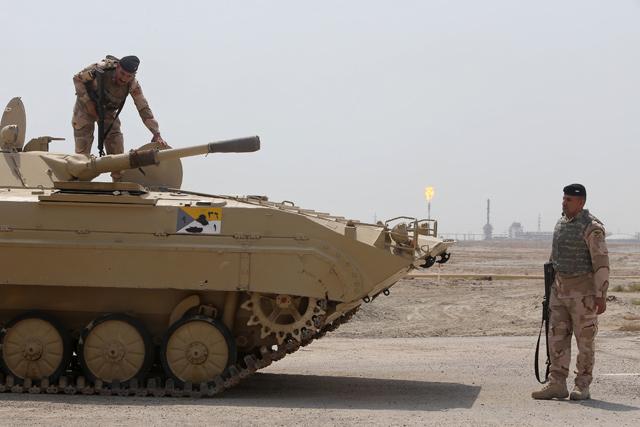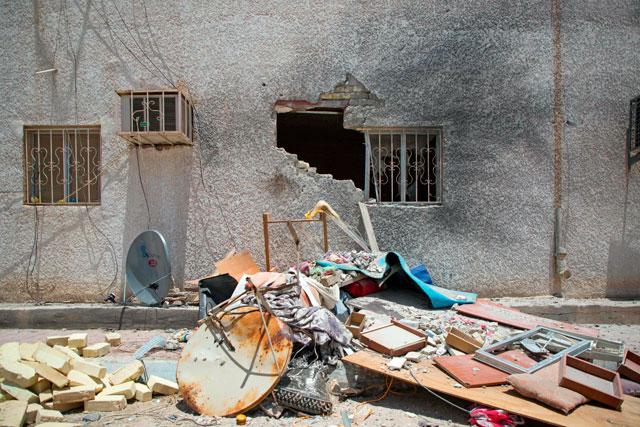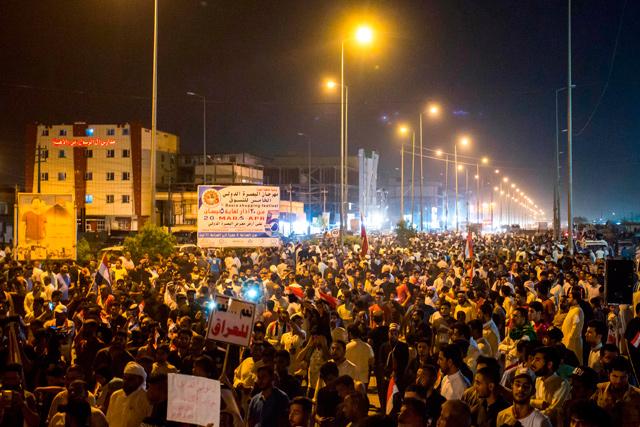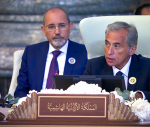You are here
Iraq caught in the middle of US-Iran face-off
By AFP - May 22,2019 - Last updated at May 22,2019

Iraqi soldiers keep guard at the entrance of the West Qurna-1 oilfield operated by Exxon Mobil near Basra, Iraq, on Monday (Reuters photo)
BAGHDAD — Scarred by two decades of conflict, Iraq finds itself caught in the middle of a US-Iranian tug-of-war, fearing it could pay the price of any confrontation between its two main allies.
Analysts say third parties may seek to exploit the latest spike in tensions between Tehran and Washington to spark a showdown that serves their own interests.
Iraq "pays a disproportionate tax on Iranian-American tensions and [has] an unenviable front-line position in any future conflict between the two," said Fanar Haddad, an Iraq expert at the National University of Singapore.
During the three-year battle to oust the Daesh group from Iraqi cities, powerful Iran-backed Shiite militias on the ground effectively fought on the same side as US-led coalition warplanes in the skies.
But since Iraq declared victory over the extremists in December 2017, relations between Washington and Tehran have deteriorated sharply.
In May last year, US President Donald Trump pulled out of a landmark 2015 nuclear deal with Iran and later re-instated tough sanctions.
This April, Washington dubbed the Islamic Revolutionary Guard Corps a "foreign terrorist organisation", prompting Iran to designate US troops across the region as "terrorists".
Tensions escalated this month, with Washington deploying a carrier group and B-52 bombers to the Gulf over alleged, unspecified Iranian "threats".
The Trump administration last week ordered non-essential diplomatic staff out of Iraq, alleging Iran-backed armed groups posed an "imminent" threat.
On Sunday, a rocket was fired into the "Green Zone" of Baghdad that houses government offices and embassies, including the US mission.
There has been no claim of responsibility.
For Iraqi political analyst Essam Al Fili, the rocket attack was a sign some sides want to pull Tehran and Washington into a confrontation in Shiite-majority Iraq.
"There are those who want to fight Iran with other people's weapons, and those who want to fight the US with other people's weapons," he said.
But he added that Iran has "so far favoured restraint in Iraq, a country which is vulnerable on the security front".
Prime Minister Adel Abdel Mahdi has echoed those fears, saying on Tuesday that Iraq would “very soon send delegations to Tehran and Washington to push for calm”.
He warned that Iraq “does not have the option of distancing itself” from US-Iranian tensions, and stressed the need to “avoid giving other parties the space to inflame the situation”.
Several groups in the Hashed Al Shaabi paramilitary coalition that battled Daesh denied any link to the rocket attack, with Assaib Ahl Al Haq chief Qais Al Khazali pointing a finger at “Israeli interests”.
Analyst Karim Bitar stressed that “the stakes are so high that Iranian proxies cannot act without an explicit green light” from Iran’s revolutionary guard force.
Tehran and Washington “know perfectly well that it’s an unwinnable war and that an all-out confrontation would be devastating for both the US and Iran”, said Bitar, an expert at France’s Institute for International and Strategic Affairs.
But, he added, “the inflammatory rhetoric of the past few weeks plays right into the hands of Iran’s hardliners” as well as pleasing Saudi Arabia and Israel, “bent on settling old scores with Iran”.
Tehran accuses its regional Sunni rival Riyadh and archfoe Israel of pressing the Trump administration to adopt a hard line.
But experts doubt the crisis will result in a head-on confrontation with Washington.
“There won’t be a direct war. The United States is counting on a collapse of the [Iranian] economy, which could be accompanied by limited air strikes,” said Iraqi political scientist Hashem Al Hashemi.
He said Washington may also urge Israel to carry out air strikes against Iran’s militia allies in Syria, Lebanon and Iraq.
Meanwhile, memories of American interventions in recent years could also dampen Washington’s appetite for an offensive.
“The US foreign policy and security establishment knows full well that attacking Iran would make the Afghanistan, Iraq, Libya wars look like walks in the park,” Bitar said.
“So besides some messages that could be sent on the Iraqi arena, unless utter madness prevails, a large, open, direct war is still unlikely.”
Related Articles
BASRA, Iraq — A rocket hit a site in southern Iraq used by foreign oil companies on Wednesday, including US energy giant ExxonMobil, woundin
BAGHDAD — Thousands of supporters of a populist Iraqi Shiite Muslim cleric urged political and factional leaders on Friday to stay out
BAGHDAD — Iraqi leaders have warned of the risks of war during a visit by Iranian Foreign Minister Mohammad Javad Zarif, whose country is lo



















